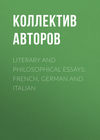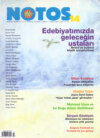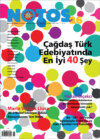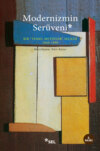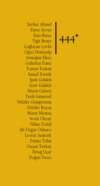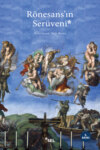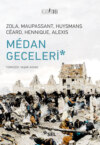Kitabı oku: «Literary and Philosophical Essays: French, German and Italian», sayfa 14
The immense reputation of the Purgatory of St. Patrick filled the whole of the Middle Ages. Preachers made appeal to the public notoriety of this great fact, to controvert those who had their doubts regarding Purgatory. In the year 1358 Edward III. gave to a Hungarian of noble birth, who had come from Hungary expressly to visit the sacred well, letters patent attesting that he had undergone his Purgatory. Narratives of those travels beyond the tomb became a very fashionable form of literature; and it is important for us to remark the wholly mythological, and as wholly Celtic, characteristics dominant in them. It is in fact evident that we are dealing with a mystery or local cult, anterior to Christianity, and probably based upon the physical appearance of the country. The idea of Purgatory, in its final and concrete form, fared specially well amongst the Bretons and the Irish. Bede is one of the first to speak of it in a descriptive manner, and the learned Mr. Wright very justly observes that nearly all the descriptions of Purgatory come from Irishmen, or from Anglo-Saxons who have resided in Ireland, such as St. Fursey, Tundale, the Northumbrian Dryhthelm, and Knight Owen. It is likewise a remarkable thing that only the Irish were able to behold the marvels of their Purgatory. A canon from Hemstede in Holland, who descended in 1494, saw nothing at all. Evidently this idea of travels in the other world and its infernal categories, as the Middle Ages accepted it, is Celtic. The belief in the three circles of existence is again to be found in the Triads, [Footnote: A series of aphorisms under the form of triplets, which give us, with numerous interpolations, the ancient teaching of the bards, and that traditional wisdom which, according to the testimony of the ancients, was transmitted by means of mnemonic verses in the schools of the Druids. under an aspect which does not permit one to see any Christian interpolation.]
The soul's peregrinations after death are also the favourite theme of the most ancient Armorican poetry. Among the features by which the Celtic races most impressed the Romans were the precision of their ideas upon the future life, their inclination to suicide, and the loans and contracts which they signed with the other world in view. The more frivolous peoples of the South saw with awe in this assurance the fact of a mysterious race, having an understanding of the future and the secret of death. Through the whole of classical antiquity runs the tradition of an Isle of Shadows, situated on the confines of Brittany, and of a folk devoted to the passage of souls, which lives upon the neighbouring coast. In the night they hear dead men prowling about their cabin, and knocking at the door. Then they rise up; their craft is laden with invisible beings; on their return it is lighter. Several of these features reproduced by Plutarch, Claudian, Procopius, [Footnote: A Byzantine historian of the fifth and sixth centuries.] and Tzetzes [Footnote: A Greek poet and grammarian of the twelfth century.] would incline one to believe that the renown of the Irish myths made its way into classical antiquity about the first or second century. Plutarch, for example, relates, concerning the Cronian Sea, fables identical with those which fill the legend of St. Malo. Procopius, describing the sacred Island of Brittia, which consists of two parts separated by the sea, one delightful, the other given over to evil spirits, seems to have read in advance the description of the Purgatory of St. Patrick, which Giraldus Cambrensis was to give seven centuries later. It cannot be doubted for a moment, after the able researches of Messrs. Ozanam, Labitte, and Wright, that to the number of poetical themes which Europe owes to the genius of the Celts, is to be added the framework of the Divine Comedy.
One can understand how greatly this invincible attraction to fables must have discredited the Celtic race in the eyes of nationalities that believed themselves to be more serious. It is in truth a strange thing, that the whole of the mediaeval epoch, whilst submitting to the influence of the Celtic imagination, and borrowing from Brittany and Ireland at least half of its poetical subjects, believed itself obliged, for the saving of its own honour, to slight and satirise the people to which it owed them. Even Chretien de Troyes, for example, who passed his life in exploiting the Breton romances for his own purposes, originated the saying —
"Les Gallois sont tous par nature
Plus sots que betes de pature."
Some English chronicler, I know not who, imagined he was making a charming play upon words when he described those beautiful creations, the whole world of which deserved to live, as "the childish nonsense with which those brutes of Bretons amuse themselves." The Bollandists [Footnote: A group of Jesuits who issued a collection of "Lives of the Saints". The first five volumes were edited by John Bolland.] found it incumbent to exclude from their collection, as apocryphal extravagances, those admirable religious legends, with which no Church has anything to compare. The decided leaning of the Celtic race towards the ideal, its sadness, its fidelity, its good faith, caused it to be regarded by its neighbours as dull, foolish, and superstitious. They could not understand its delicacy and refined manner of feeling. They mistook for awkwardness the embarrassment experienced by sincere and open natures in the presence of more artificial natures. The contrast between French frivolity and Breton stubbornness above all led, after the fourteenth century, to most deplorable conflicts, whence the Bretons ever emerged with a reputation for wrong-headedness.
It was still worse, when the nation that most prides itself on its practical good sense found confronting it the people that, to its own misfortune, is least provided with that gift. Poor Ireland, with her ancient mythology, with her Purgatory of St. Patrick, and her fantastic travels of St. Brandan, was not destined to find grace in the eyes of English puritanism. One ought to observe the disdain of English critics for these fables, and their superb pity for the Church which dallies with Paganism, so far as to keep up usages which are notoriously derived from it. Assuredly we have here a praiseworthy zeal, arising from natural goodness; and yet, even if these flights of imagination did no more than render a little more supportable many sufferings which are said to have no remedy, that after all would be something. Who shall dare to say where, here on earth, is the boundary between reason and dreaming? Which is worth more, the imaginative instinct of man, or the narrow orthodoxy that pretends to remain rational, when speaking of things divine? For my own part, I prefer the frank mythology, with all its vagaries, to a theology so paltry, so vulgar, and so colourless, that it would be wronging God to believe that, after having made the visible world so beautiful he should have made the invisible world so prosaically reasonable.
In presence of the ever-encroaching progress of a civilisation which is of no country, and can receive no name, other than that of modern or European, it would be puerile to hope that the Celtic race is in the future to succeed in obtaining isolated expression of its originality. And yet we are far from believing that this race has said its last word. After having put in practice all chivalries, devout and worldly, gone with Peredur in quest of the Holy Grail and fair ladies, and dreamed with St. Brandan of mystical Atlantides, who knows what it would produce in the domain of intellect, if it hardened itself to an entrance into the world, and subjected its rich and profound nature to the conditions of modern thought? It appears to me that there would result from this combination, productions of high originality, a subtle and discreet manner of taking life, a singular union of strength and weakness, of rude simplicity and mildness. Few races have had so complete a poetic childhood as the Celtic; mythology, lyric poetry, epic, romantic imagination, religious enthusiasm – none of these failed them; why should reflection fail them? Germany, which commenced with science and criticism, has come to poetry; why should not the Celtic races, which began with poetry, finish with criticism? There is not so great a distance from one to the other as is supposed; the poetical races are the philosophic races, and at bottom philosophy is only a manner of poetry. When one considers how Germany, less than a century ago, had her genius revealed to her, how a multitude of national individualities, to all appearance effaced, have suddenly risen again in our own days, more instinct with life than ever, one feels persuaded that it is a rash thing to lay down any law on the intermittence and awakening of nations; and that modern civilisation, which appeared to be made to absorb them, may perhaps be nothing more than their united fruition.
THE EDUCATION OF THE HUMAN RACE
BY GOTTHOLD EPHRAIM LESSINO
TRANSLATED BY
F. W. ROBERTSON
INTRODUCTORY NOTE
Lessing's life has been sketched in the introduction to his "Minna von Barnhelm" in the volume of Continental Dramas in The Harvard Classics.
"The Education of the Human Race" is the culmination of a bitter theological controversy which began with the publication by Lessing, in 1774-1778, of a series of fragments of a work on natural religion by the German deist, Reimarus. This action brought upon Lessing the wrath of the orthodox German Protestants, led by J. M. Goeze, and in the battle that followed Lessing did his great work for the liberalising of religious thought in Germany. The present treatise is an extraordinarily condensed statement of the author's attitude towards the fundamental questions of religion, and gives his view of the signification of the previous religious history of mankind, along with his faith And hope for the future.
As originally issued, the essay purported to be merely edited by Lessing; but there is no longer any doubt as to his having been its author. It is an admirable and characteristic expression of the serious and elevated spirit in which he dealt with matters that had then, as often, been degraded by the virulence of controversy.
THE EDUCATION OF THE HUMAN RACE
1
That which Education is to the Individual, Revelation is to the Race.
2
Education is Revelation coming to the Individual Man; and Revelation is Education which has come, and is yet coming, to the Human Race.
3
Whether it can be of any advantage to the science of instruction to contemplate Education in this point of view, I will not here inquire; but in Theology it may unquestionably be of great advantage, and may remove many difficulties, if Revelation be conceived of as the Educator of Humanity.
4
Education gives to Man nothing which he might not educe out of himself; it gives him that which he might educe out of himself, only quicker and more easily. In the same way too, Revelation gives nothing to the human species, which the human reason left to itself might not attain; only it has given, and still gives to it, the most important of these things earlier.
5
And just as in Education, it is not a matter of indifference in what order the powers of a man are developed, as it cannot impart to a man all at once; so was God also necessitated to maintain a certain order, and a certain measure in His Revelation.
6
Even if the first man were furnished at once with a conception of the One God; yet it was not possible that this conception, imparted, and not gained by thought, should subsist long in its clearness. As soon as the Human Reason, left to itself, began to elaborate it, it broke up the one Immeasurable into many Measurables, and gave a note or sign of mark to every one of these parts.
7
Hence naturally arose polytheism and idolatry. And who can say how many millions of years human reason would have been bewildered in these errors, even though in all places and times there were individual men who recognized them as errors, had it not pleased God to afford it a better direction by means of a new Impulse?
8
But when He neither could nor would reveal Himself any more to each individual man, He selected an individual People for His special education; and that exactly the most rude and the most unruly, in order to begin with it from the very commencement.
9
This was the Hebrew People, respecting whom we do not in the least know what kind of Divine Worship they had in Egypt. For so despised a race of slaves was not permitted to take part in the worship of the Egyptians; and the God of their fathers was entirely unknown to them.
10
It is possible that the Egyptians had expressly prohibited the Hebrews from having a God or Gods, perhaps they had forced upon them the belief that their despised race had no God, no Gods, that to have a God or Gods was the prerogative of the superior Egyptians only, and this may have been so held in order to have the power of tyrannising over them with a greater show of fairness. Do Christians even now do much better with their slaves?
11
To this rude people God caused Himself to be announced first, simply as "the God of their fathers," in order to make them acquainted and familiar with the idea of a God belonging to them also, and to begin with confidence in Him.
12
Through the miracles with which He led them out of Egypt, and planted them in Canaan, He testified of Himself to them as a God mightier than any other God.
13
And as He proceeded, demonstrating Himself to be the Mightiest of all, which only One can be, He gradually accustomed them thus to the idea of THE ONE.
14
But how far was this conception of The One, below the true transcendental conception of the One which Reason learnt to derive, so late with certainty, from the conception of the Infinite One?
15
Although the best of the people were already more or less approaching the true conception of the One only, the people as a whole could not for a long time elevate themselves to it. And this was the sole true reason why they so often abandoned their one God, and expected to find the One, i. e., as they meant, the Mightiest, in some God or other, belonging to another people.
16
But of what kind of moral education was a people so raw, so incapable of abstract thoughts, and so entirely in their childhood capable? Of none other but such as is adapted to the age of children, an education by rewards and punishments addressed to the senses.
17
Here too Education and Revelation meet together. As yet God could give to His people no other religion, no other law than one through obedience to which they might hope to be happy, or through disobedience to which they must fear to be unhappy. For as yet their regards went no further than this earth. They knew of no immortality of the soul; they yearned after no life to come. But now to reveal these things to one whose reason had as yet so little growth, what would it have been but the same fault in the Divine Rule as is committed by the schoolmaster, who chooses to hurry his pupil too rapidly, and boast of his progress, rather than thoroughly to ground him?
18
But, it will be asked, to what purpose was this education of so rude a people, a people with whom God had to begin so entirely from the beginning? I reply, in order that in the process of time He might employ particular members of this nation as the Teachers of other people. He was bringing up in them the future Teachers of the human race. It was the Jews who became their teachers, none but Jews; only men out of a people so brought up, could be their teachers.
19
For to proceed. When the Child by dint of blows and caresses had grown and was now come to years of understanding, the Father sent it at once into foreign countries: and here it recognised at once the Good which in its Father's house it had possessed, and had not been conscious of.
20.
While God guided His chosen people through all the degrees of a child-like education, the other nations of the earth had gone on by the light of reason. The most part had remained far behind the chosen people. Only a few had got before them. And this too, takes place with children, who are allowed to grow up left to themselves: many remain quite raw, some educate themselves even to an astonishing degree.
21
But as these more fortunate few prove nothing against the use and necessity of Education, so the few heathen nations, who even appear to have made a start in the knowledge of God before the chosen people, prove nothing against a Revelation. The Child of Education begins with slow yet sure footsteps; it is late in overtaking many a more happily organised child of nature; but it does overtake it; and thenceforth can never be distanced by it again.
22
Similarly – Putting aside the doctrine of the Unity of God, which in a way is found, and in a way is not found, in the books of the Old Testament – that the doctrine of immortality at least is not discoverable in it, is wholly foreign to it, that all doctrine connected therewith of reward and punishment in a future life, proves just as little against the Divine origin of these books. Notwithstanding the absence of these doctrines, the account of miracles and prophecies may be perfectly true. For let us suppose that these doctrines were not only wanting therein, but even that they were not at all true; let us suppose that for mankind all was over in this life; would the Being of God be for this reason less demonstrated? Would God be for this less at liberty, would it less become Him to take immediate charge of the temporal fortunes of any people out of this perishable race? The miracles which He performed for the Jews, the prophecies which He caused to be recorded through them, were surely not for the few mortal Jews, in whose time they had happened and been recorded: He had His intentions therein in reference to the whole Jewish people, to the entire Human Race, which, perhaps, is destined to remain on earth forever, though every individual Jew and every individual man die forever.
23
Once more, The absence of those doctrines in the writings of the Old Testament proves nothing against their Divinity. Moses was sent from God even though the sanction of his law only extended to this life. For why should it extend further? He was surely sent only to the Israelitish people of that time, and his commission was perfectly adapted to the knowledge, capacities, yearnings of the then existing Israelitish people, as well as to the destination of that which belonged to the future. And this is sufficient.
24
So far ought Warburton to have gone, and no further. But that learned man overdrew his bow. Not content that the absence of these doctrines was no discredit to the Divine mission of Moses, it must even be a proof to him of the Divinity of the mission. And if he had only sought this proof in the adaptation of such a law to such a people!
But he betook himself to the hypothesis of a miraculous system continued in an unbroken line from Moses to Christ, according to which, God had made every individual Jew exactly happy or unhappy, in the proportion to his obedience or disobedience to the law deserved. He would have it that this miraculous system had compensated for the want of those doctrines (of eternal rewards and punishments, &c.), without which no state can subsist; and that such a compensation even proved what that want at first sight appeared to negative.
25
How well it was that Warburton could by no argument prove or even make likely this continuous miracle, in which he placed the existence of Israelitish Theocracy! For could he have done so, in truth, he could then, and not till then, have made the difficulty really insuperable, to me at least. For that which was meant to prove the Divine character of the Mission of Moses, would have rendered the matter itself doubtful, which God, it is true, did not intend then to reveal; but which on the other hand, He certainly would not render unattainable.
26
I explain myself by that which is a picture of Revelation. A Primer for children may fairly pass over in silence this or that important piece of knowledge or art which it expounds, respecting which the Teacher judged, that it is not yet fitted for the capacities of the children for whom he was writing. But it must contain absolutely nothing which blocks up the way towards the knowledge which is held back, or misleads the children from it. Rather far, all the approaches towards it must be carefully left open; and to lead them away from even one of these approaches, or to cause them to enter it later than they need, would alone be enough to change the mere imperfection of such a Primer into an actual fault.
27
In the same way, in the writings of the Old Testament those primers for the rude Israelitish people, unpractised in thought, the doctrines of the immortality of the soul, and future recompenses, might be fairly left out: but they were bound to contain nothing which could have even procrastinated the progress of the people, for whom they were written, in their way to this grand truth. And to say but a small thing, what could have more procrastinated it than the promise of such a miraculous recompense in this life? A promise made by Him who promises nothing that He does not perform.
28
For although unequal distribution of the goods of this life, Virtue and Vice seem to be taken too little into consideration, although this unequal distribution docs not exactly afford a strong proof of the immortality of the soul and of a life to come, in which this difficulty will be reserved hereafter, it is certain that without this difficulty the human understanding would not for a long time, perhaps never, have arrived at better or firmer proofs. For what was to impel it to seek for these better proofs? Mere curiosity?
29
An Israelite here and there, no doubt, might have extended to every individual member of the entire commonwealth, those promises and threatenings which belong to it as a whole, and be firmly persuaded that whosoever should be pious must also be happy, and that whoever was unhappy must be bearing the penalty of his wrong-doing, which penalty would forthwith change itself into blessing, as soon as he abandoned his sin. Such a one appears to have written Job, for the plan of it is entirely in this spirit.
30
But daily experience could not possibly be permitted to confirm this belief, or else it would have been all over, for ever, with people who had this experience, so far as all recognition and reception was concerned of the truth as yet unfamiliar to them. For if the pious were absolutely happy, and it also of course was a necessary part of his happiness that his satisfaction should be broken by no uneasy thoughts of death, and that he should die old, and satisfied with life to the full: how could he yearn after another life? and how could he reflect upon a thing after which he did not yearn? But if the pious did not reflect thereupon, who then should reflect? The transgressor? he who felt the punishments of his misdeeds, and if he cursed this life, must have so gladly renounced that other existence?
31
Much less would it signify if an Israelite here and there directly and expressly denied the immortality of the soul and future recompense, on account of the law having no reference thereto. The denial of an individual, had it even been a Solomon, did not arrest the progress of the general reason, and was even in itself a proof that the nation had now come a great step nearer the truth For individuals only deny what the many are bringing into consideration; and to bring into consideration that, concerning which no one troubled himself at all before, is half way to knowledge.
32
Let us also acknowledge that it is a heroic obedience to obey the laws of God simply because they are God's laws, and not because He has promised to reward the obedience to them here and there; to obey them even though there be an entire despair of future recompense, and uncertainty respecting a temporal one.
33
Must not a people educated in this heroic obedience towards God have been destined, must they not have been capable beyond all others of executing Divine purpose? of quite a special character? Let the soldier, who pays blind obedience to his leader, become also convinced of his leader's wisdom, and then say what that leader may not undertake to achieve with him.
34
As yet the Jewish people had reverenced in their Jehovah rather the mightiest than the wisest of all Gods; as yet they had rather feared Him as a Jealous God than loved Him: a proof this too, that the conception which they had of their eternal One God was not exactly the right conception which we should have of God. However, now the time was come that these conceptions of theirs were to be expanded, ennobled, rectified, to accomplish which God availed Himself of a quite natural means, a better and more correct measure, by which it got the opportunity of appreciating Him.
35
Instead of, as hitherto, appreciating Him in contrast with the miserable idols of the small neighboring peoples, with whom they lived in constant rivalry, they began, in captivity under the wise Persians, to measure Him against the "Being of all Beings" such as a more disciplined reason recognized and reverenced.
36
Revelation had guided their reason, and now, all at once, reason gave clearness to their Revelation.
37
This was the first reciprocal influence which these two (Reason and Revelation) exercised on one another; and so far is the mutual influence from being unbecoming to the Author of them both, that without it either of them would have been useless.
38
The child, sent abroad, saw other children who knew more, who lived more becomingly, and asked itself, in confusion, "Why do I not know that too? Why do I not live so too? Ought I not to have been taught and admonished of all this in my father's house?" Thereupon it again sought out its Primer, which had long been thrown into a corner, in order to throw off a blame upon the Primer. But behold, it discovers that the blame does not rest upon the books, that the shame is solely its own, for not having long ago, known this very thing, and lived in this very way.
39
Since the Jews, by this time, through the medium of the pure Persian doctrine, recognized in their Jehovah, not simply the greatest of all national deities, but GOD; and since they could, the more readily find Him and indicate Him to others in their sacred writings, inasmuch as He was really in them; and since they manifested as great an aversion for sensuous representations, or at all events, were instructed in these Scriptures, to have an aversion to them as great as the Persians had always felt; what wonder that they found favor in the eyes of Cyrus, with a Divine Worship which he recognized as being, no doubt, far below pure Sabeism, but yet far above the rude idolatries which in its stead had taken possession of the forsaken land of the Jews.
40
Thus enlightened respecting the treasures which they had possessed, without knowing it, they returned, and became quite another people, whose first care it was to give permanency to this illumination amongst themselves. Soon an apostacy and idolatry among them was out of the question. For it is possible to be faithless to a national deity, but never to God, after He has once been recognised.
The theologians have tried to explain this complete change in the Jewish people in a different way; and one, who has well demonstrated the insufficiency of these explanations, at last was for giving us, as a true account – "the visible fulfilment of the prophecies which had been spoken and written respecting the Babylonish captivity and the restoration from it." But even this reason can be only so far the true one, as it presupposes the, by this time, exalted ideas of God. The Jews must by this time have recognised that to do miracles, and to predict the future, belonged only to God, both of which they had ascribed formerly to false idols, by which it came to pass that even miracles and prophecies had hitherto made so weak an impression upon them.
42
Doubtless, the Jews were made more acquainted with the doctrine of immortality among the Chaldeans and Persians. They became more familiar with it too in the schools of the Greek Philosophers in Egypt.
43
However, as this doctrine was not in the same condition in reference to their Scriptures that the doctrines of God's Unity and Attributes were – since the former were entirely overlooked by that sensual people, while the latter would be sought for: – and since too, for the former, previous exercising was necessary, and as yet there had been only hints and allusions, the faith in the immortality of the soul could naturally never be the faith of the entire people. It was and continued to be only the creed of a certain section of them.
44
An example of what I mean by "previous exercising" for the doctrine of immortality, is the Divine threatenings of punishing the misdeeds of the fathers upon the children unto the third and fourth generation. This accustomed the fathers to live in thought with their remotest posterity, and to feel, as it were, beforehand, the misfortune which they had brought upon these guiltless ones.
45
By an allusion I mean that which was intended only to excite curiosity and to occasion questions. As, for instance, the oft- recurring mode of expression, describing death by "he was gathered to his fathers."
By a "hint" I mean that which already contains any germ, out of which the, as yet, held back truth allows itself to be developed. Of this character was the inference of Christ from the naming of God "the God of Abraham, Isaac, and Jacob." This hint appears to me to be unquestionably capable of being worked out into a strong proof.
47
In such previous exercitations, allusions, hints, consists the positive perfection of a Primer; just as the above-mentioned peculiarity of not throwing difficulties or hindrances in the way to the suppressed truth constitutes the negative perfection of such a book.
